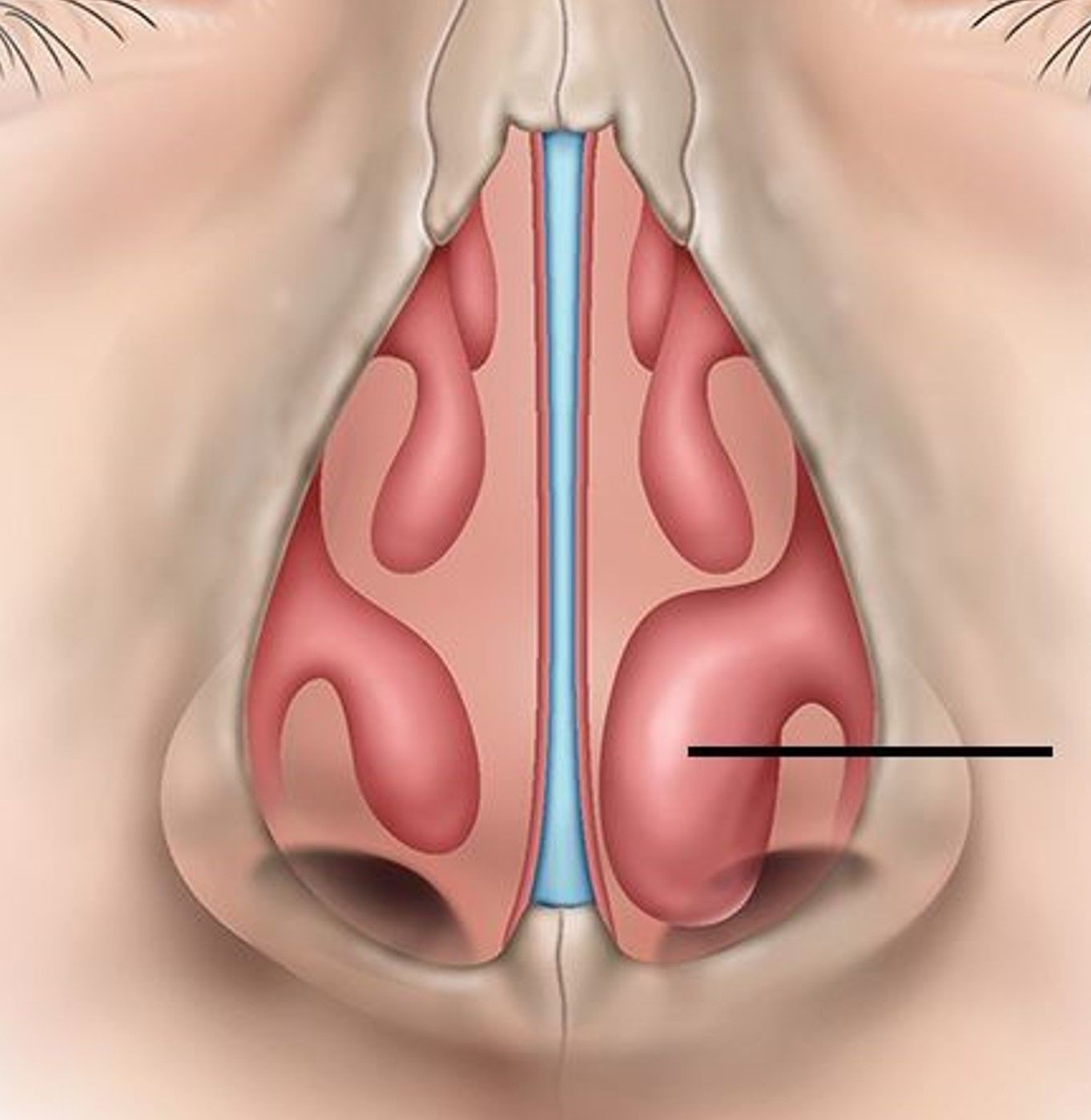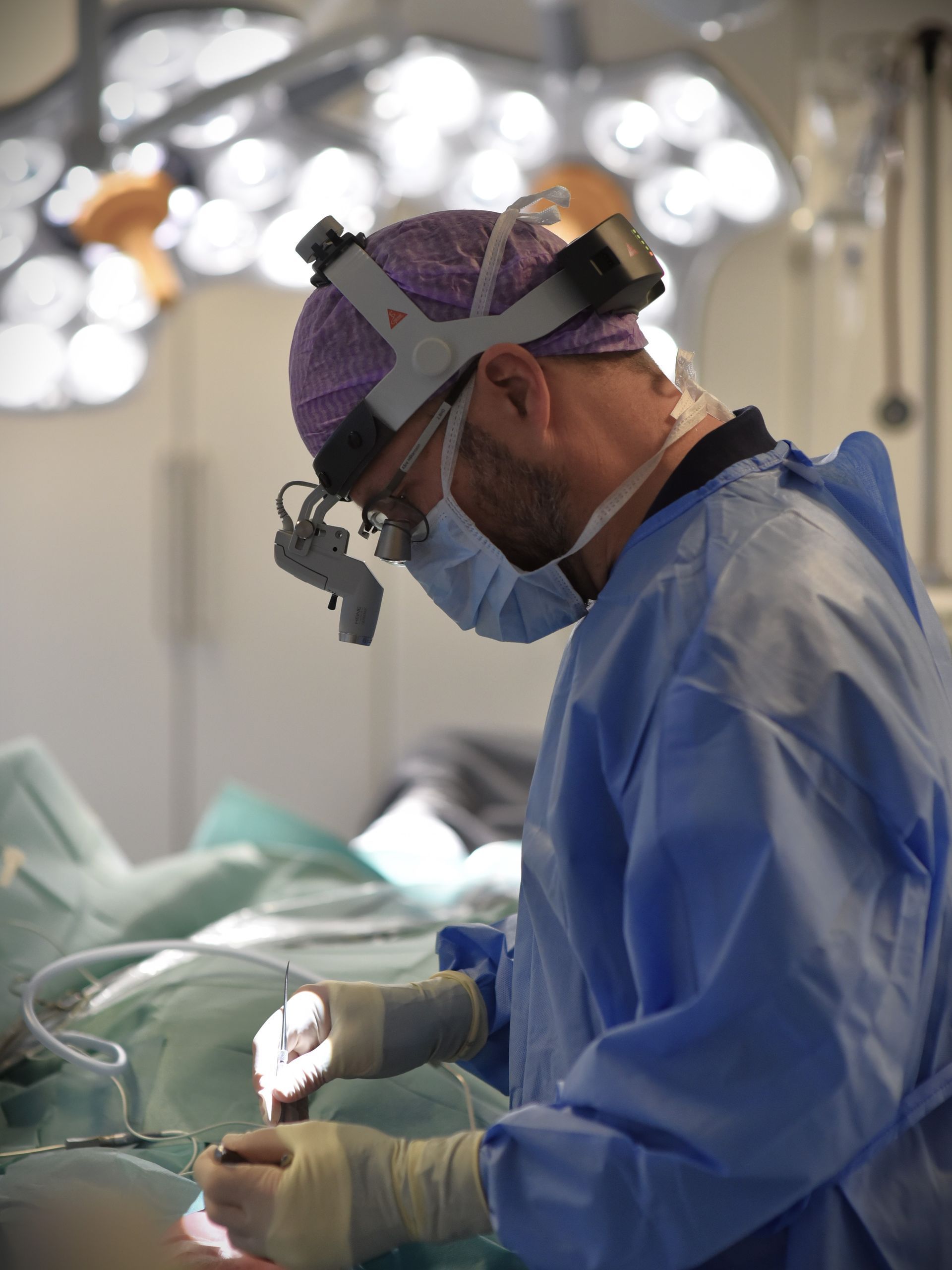Nasal turbinate surgery (Conchotomy)
With surgery on the nasal turbinates (turbinate bones), you will quickly get better air in your nose.
Surgery of the nasal septum - also called the turbinate - with a focus on safety and security
At Charlottenlund Privathospital, some of Denmark's most experienced surgeons are ready to perform surgery on enlarged turbinates in the nose without waiting. We have a very long experience with surgery on both deviated nasal septums and turbinates in the nose and have many years of expertise in the field. At Charlottenlund Privathospital, all surgeons who perform this procedure have performed many hundreds of this type of surgery. This ensures that the safety and results are top-notch. The treatment is often covered by private health insurance.
How do you know if you need surgery for nasal polyps?
Enlarged turbinates in the nose cause some of the same symptoms as a deviated nasal septum, which can be long-term nasal congestion that is often unilateral, but can also be alternating or total, as well as contributing to headaches, facial pressure, reduced sense of smell and frequent sinus infections. Many people who suffer from enlarged turbinates become addicted to over-the-counter nasal sprays, as these often provide a fantastic effect (unlike patients who suffer from deviated nasal septums), which is why the risk of addiction to these products is present. Common to almost all patients is that the nose is most blocked at night. If you recognize some of these symptoms, surgery for enlarged turbinates (conchotomy) can be an effective solution to your problems.
The surgery can be part of larger nasal sinus surgeries, but is also often performed independently.
This is how surgery for enlarged turbinates in the nose is performed - conchotomy.
A conchotomy is a laparoscopic surgery where the surgeon, using a video camera through the nostrils and completely without a scar, removes the excess tissue from the lower turbinate bones - either on one or both sides. At Charlottenlund Privathospital, the operation is always performed under full anesthesia and lasts between 30 and 45 minutes in the hands of an experienced surgeon.
Aftercare and healing – what you need to know
After the operation, you will need to stay in hospital for observation for a short period of time, after which you will be able to go home the same day. Most patients experience only mild discomfort in the first few days after treatment, but bleeding may occur and last for up to a week, as the corpora cavernosa have a very rich blood supply. Most people can resume their daily activities after about 4-7 days, while physically demanding activities should be avoided for about 14 days.
Our specialist doctors ensure that you receive thorough information about the aftercare and pain relief on the day of surgery.
Book a consultation
Are you experiencing symptoms of a blocked nose or have you become addicted to nasal spray? Book an appointment with our specialists today and get a professional assessment. We ensure safe and secure treatment with the country's highest expertise.
📞 Contact us now – We are ready to help.
Pre-study
When you have been diagnosed with concha hypertrophy or enlarged turbinates / turbinates, and you are scheduled for surgery, you will need to undergo a preliminary examination. The preliminary examination takes place at our private hospital in Charlottenlund, where the doctor examines your nose and sinuses with a short binocular examination and possibly a review of the CT scan of your sinuses. Cotton wool with adrenaline will also be placed in your nose to give you an impression of how much the swollen mucous membranes mean for the condition and how much you can achieve with surgery.
During the preliminary examination, the surgeon determines what is needed and whether a conchotomy will be the solution. In some cases, the surgeon will recommend a completely different operation, such as a correction of the nasal septum. In such cases, there will of course be a dialogue about this and a thorough explanation of what options there are for treatment.
Operation
Surgery for enlarged turbinates (conchotomy) is performed under general anesthesia and takes about an hour. The surgery may take longer if surgery is also required for a deviated nasal septum, nasal polyps, or sinuses.
The surgery does not leave any visible scars or any visible changes to the appearance of the nose. Everything is done through the nostrils.
After surgery, a short sick leave may be required, but most people are ready to go back to work within a week. Strenuous physical work can be resumed after 14 days.
A patient writes the following on TrustPilot after surgery at Kåre in 2024:
''After having 3 nasal septum surgeries in the public sector. I then have a turbinate reduction surgery at Chalottenlund Private Hospital. Just want to say it's the best thing I've ever done for myself, now I can finally get my night's sleep after 25 years of problems with breathing problems. Huge praise to Kåre who operated on me and everyone else at the hospital. I am eternally grateful''
Read also about:
Surgery for chronic sinusitis CAS FESS
Surgery for a deviated nasal septum (septum repair)
Surgery for frequent nosebleeds
You can also read more about treating chronic sinusitis at sundhed.dk.
Frequently Asked Questions
What is a nasal polyp?
The nasal conchae or conchae nasales are swellings that fill the nasal cavity. There are three on each side - one at the top, one in the middle, and one at the bottom.
Around the upper one are the small nerve fibers for the sense of smell - the middle one is located just outside the entrance to the maxillary sinus, while the lower one is located at the bottom of the nose, right where the air must pass. The spongy bodies are richly supplied with blood and therefore warm and moist. This is to be able to humidify and warm the air before it passes into the lungs and to be able to catch foreign objects in the air before they pass into the lungs.
How do enlarged clam bones occur?
We don't know exactly why some turbinates start to grow. Irritant conditions such as smoking and allergies are thought to contribute, just as the turbinate of the nose sometimes grows if the nasal septum tilts to the opposite side. This is called reactive concha hypertrophy and is very well known.
Most patients with enlarged turbinates in the nose have reported good results from over-the-counter nasal sprays, which cause the mucous membranes to contract. Similarly, patients experience that the problems worsen when they lie down, and the combination of the two experiences is very typical for the patients we encounter with enlarged turbinates in the nose.
When should enlarged clam bones be treated?
Most people experience a blocked nose on one or both sides when they have a cold. If the symptoms persist, it can be easy to become desperate when you can't get air through your nose at night, or are constantly blocked on one or both sides. Many people therefore choose the easy solution and start taking Otrivin or Zymelin - only to quickly become addicted to them. This only makes the pain worse, and contributes to the nose closing off completely in the long term.
The first thing your doctor will therefore do - before surgery is even considered - is to make sure that any abuse of over-the-counter nasal spray has stopped.
Your surgeon can help you with this and prescribe medication that makes it easier to put the over-the-counter medication on the shelf. If this proves to be insufficient and the treatment we initiate does not work, surgery may be an option. Surgery is never the first choice.
Why choose Charlottenlund Private Hospital?
Safe and caring treatment by the staff present with minimal risk.
Charlottenlund Private Hospital has extensive experience with conchotomy. We offer:
• Experienced specialists with a high number of performed procedures. All surgeons have performed over five hundred independent procedures. The operation is only performed by surgeons trained in endoscopic sinus surgery and a binocular technique is always used, which ensures unsurpassed insight and overview for the surgeon.
• Modern facilities and the latest equipment for optimal patient experience.


Book an appointment for treatment of enlarged nasal turbinates (conchotomy)
If you believe you suffer from enlarged turbinates and would like to be treated with us, please feel free to contact us. Our secretaries are ready to help and answer any questions you may have, as well as to find time for a preliminary examination and surgery.


